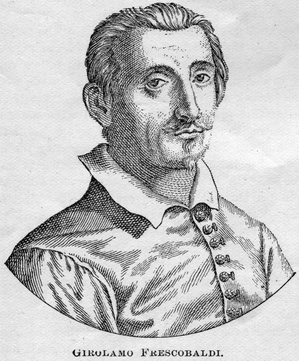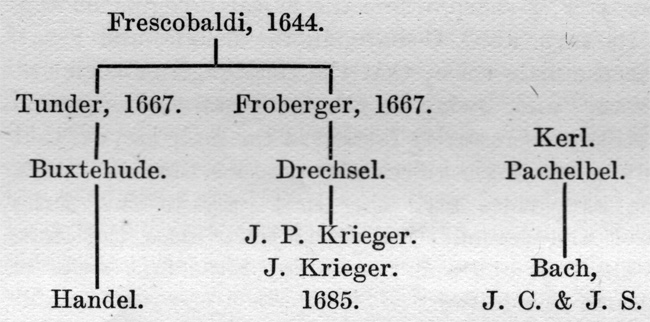 Girolamo Frescobaldi, who was a skilled harpsichord-player, was born in Ferrara, a small Italian city about twenty-eight miles north of Bologna, in 1587. When but a boy he possessed a remarkable voice, and frequently wandered from town to town singing, on which occasions he was followed by crowds of admirers. History tells us very little of his life, but at the age of twenty he had acquired considerable notoriety as a talented organist. He studied with François Milleville till he journeyed to Belgium to become familiar with the Netherlandish doctrines with which he was greatly in sympathy. In 1608 he returned to the sunny South and took up his residence in Milan. About this time his compositions were being published and were receiving very favorable notices. In 1614 or 1615 he went to Rome to fill the position of organist at St. Peter’s. His reputation had become so great and the love for organ-music was so predominant with the Italian people of that age that thirty thousand people flocked to the cathedral to hear his first recital.
Girolamo Frescobaldi, who was a skilled harpsichord-player, was born in Ferrara, a small Italian city about twenty-eight miles north of Bologna, in 1587. When but a boy he possessed a remarkable voice, and frequently wandered from town to town singing, on which occasions he was followed by crowds of admirers. History tells us very little of his life, but at the age of twenty he had acquired considerable notoriety as a talented organist. He studied with François Milleville till he journeyed to Belgium to become familiar with the Netherlandish doctrines with which he was greatly in sympathy. In 1608 he returned to the sunny South and took up his residence in Milan. About this time his compositions were being published and were receiving very favorable notices. In 1614 or 1615 he went to Rome to fill the position of organist at St. Peter’s. His reputation had become so great and the love for organ-music was so predominant with the Italian people of that age that thirty thousand people flocked to the cathedral to hear his first recital.
His life in Rome, as far as can be learned, was uneventful; he devoted most of his time to composition. He was one of the inventors of the fugue, or rather the first to apply it to organ-music in Italy, and revived the double counterpoint of the old French school, which had fallen into disuse, except in the hands of Orlando di Lasso, who still employed it in his writings. No other Italian organist exerted so much influence on organ-music as did Frescobaldi, and undoubtedly he prepared the way for Lotti and Scarlatti, and later for Bach and Handel. Sir John Hawkins has this to say, in his “History of the Science and Practice of Music,” concerning the influence of Frescobaldi:
“Of many musicians it has been said that they were the fathers of a particular style; as that Palestrina was the father of the church style, Monteverde of the dramatic, and Carissimi of the chamber style; of Frescobaldi it may as truly be said that he was the father of that organ style which has prevailed not less in England than in other countries for more than a hundred years past, and which consists in a prompt and ready discussion of some premeditated subject in a quicker succession of notes than is required in the accompaniment of chorale harmony.
Exercises of this kind on the organ are usually called toccatas, from the Italian word signifying ‘to touch’; and, for want of a better word to express them, they are here in England called voluntaries. In the Romish service they occur at frequent intervals, particularly at the elevation, first communions, and during the offerings; and in that of our church in the morning prayer, after the psalms, and after the benediction, or, in other words, between the first and second services; and in the evening service after the psalms.”
Musicians who wish to study thoroughly the development of piano and organ music always go back to the fifteenth century, and even earlier; but in Frescobaldi we always find the firm foundation-stone of the wonderful structure reared by Bach and Handel, as seen in the following little chart:

Frescobaldi died in 1644. The next name of importance was that of his pupil, Johann Jakob Froberger, born at Halle, who died in 1667, and who specially devoted himself to clavier music. Now, Johann Philipp Krieger, the elder of the two brothers, studied under Drechsel, a pupil of Froberger, a distinguished Nuremberg organist. Johann P. Krieger taught and greatly influenced his younger brother, Johann.
Now, Johann Christoph Bach, elder brother of J. S. Bach, was a pupil for three years of Pachelbel, who was co-organist at St. Stephen’s, Vienna, with Johann Casper Kerl; and both were in a thoroughly Froberger atmosphere, for Froberger had been organist there for many years, and had only been dead for seven years when they took office in 1774.
Then Johann Christoph, elder brother of Johann Sebastian Bach, studied with Pachelbel, and he taught his brother J. S. Bach, and specially introduced Pachelbel’s music to him. We thus see how close a connection there was between Krieger and the great Bach. It may also be mentioned that Pachelbel, like the two Kriegers, was a native of Nuremberg.
Handel was influenced by composers of North Germany, especially Buxtehude, who was successor at St. Mary’s, Lubeck, and also son-in-law of Franz Tunder, who studied with Frescobaldi about 1640. Thus we can trace the influence of Frescobaldi, both on Handel and on Bach.



